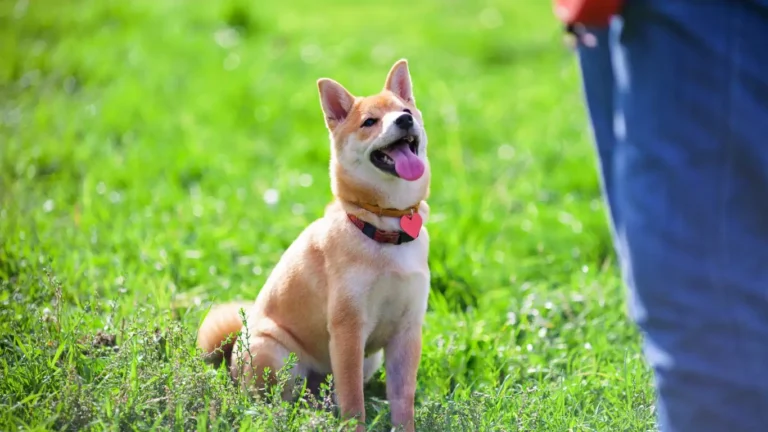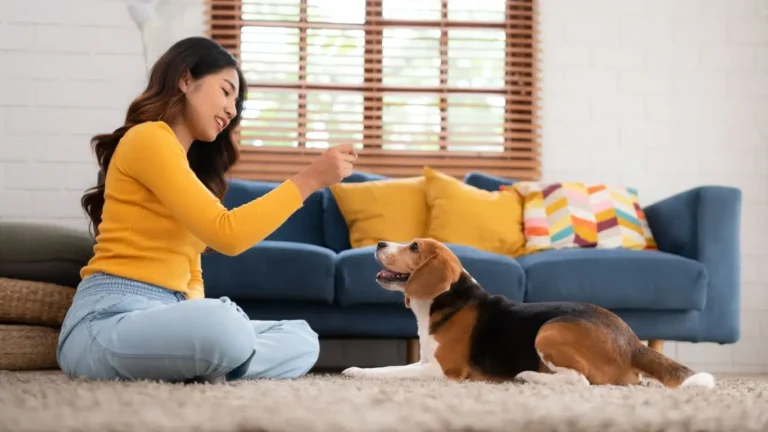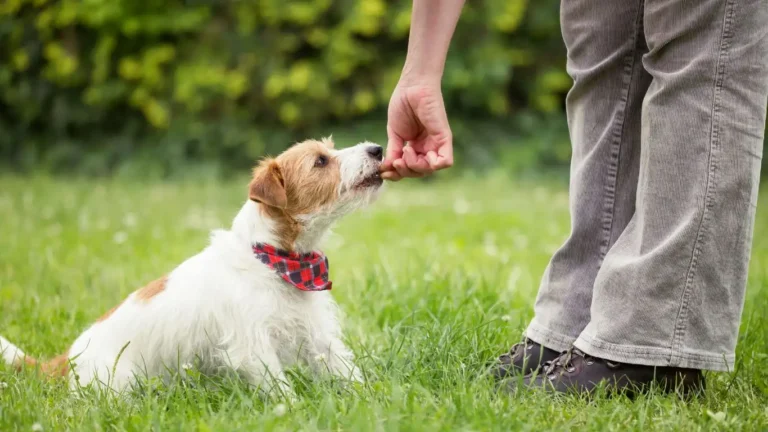How to Train a Dog to Sleep Through the Night – Stop Restless Nights!
Getting your pup to snooze soundly through the night can feel like an impossible task—I’ve been there! As a Certified Professional Dog Trainer (CPDT-KA), I’ve helped countless dog owners tackle this challenge. Whether you’re dealing with a restless puppy or an anxious adult dog, learning how to train a dog to sleep through the night is all about setting up the right routine and environment. Trust me, with a few adjustments and some patience, you’ll be enjoying uninterrupted sleep in no time.
Why Won’t My Dog Sleep Through the Night?
Before jumping into training solutions, it’s important to understand why your dog is struggling to sleep at night. Dogs wake up for all sorts of reasons, and pinpointing the cause can make training much easier.
Common Reasons Your Dog Won’t Settle
- Too Much Energy Before Bed: A dog with pent-up energy isn’t going to settle down easily.
- Hunger or Thirst: If your dog isn’t eating at the right times, they might wake up feeling hungry.
- Bathroom Needs: Puppies, in particular, have tiny bladders and may need a potty break.
- Discomfort or Pain: A lumpy bed or an underlying health issue could be making sleep difficult.
- Anxiety or Fear: Some dogs have separation anxiety or fear of the dark.
Setting Up the Perfect Sleep Environment

Think of your dog’s sleeping area like a comfy hotel room. If their space isn’t inviting, they’re not going to want to sleep there.
Choosing the Right Bed
A good dog bed makes all the difference. When I adopted my rescue pup, he refused to sleep on the first bed I bought—turns out, it was too firm for his liking! Consider these factors when picking the perfect bed:
- Size: Your dog should be able to stretch out fully.
- Material: Memory foam is great for older dogs, while a soft plush bed is ideal for smaller breeds.
- Washability: Choose a bed with a removable, machine-washable cover to keep things fresh.
Ideal Sleeping Location
Where your dog sleeps matters just as much as what they sleep on. Some dogs prefer sleeping in a crate, while others like an open dog bed. Here’s what I recommend:
- Crate Training: If done right, a crate can feel like a cozy den.
- A Quiet Spot: Keep their bed in a low-traffic area away from noise.
- Consistent Placement: Dogs thrive on routine, so don’t move their bed around too often.
Establishing a Solid Nighttime Routine
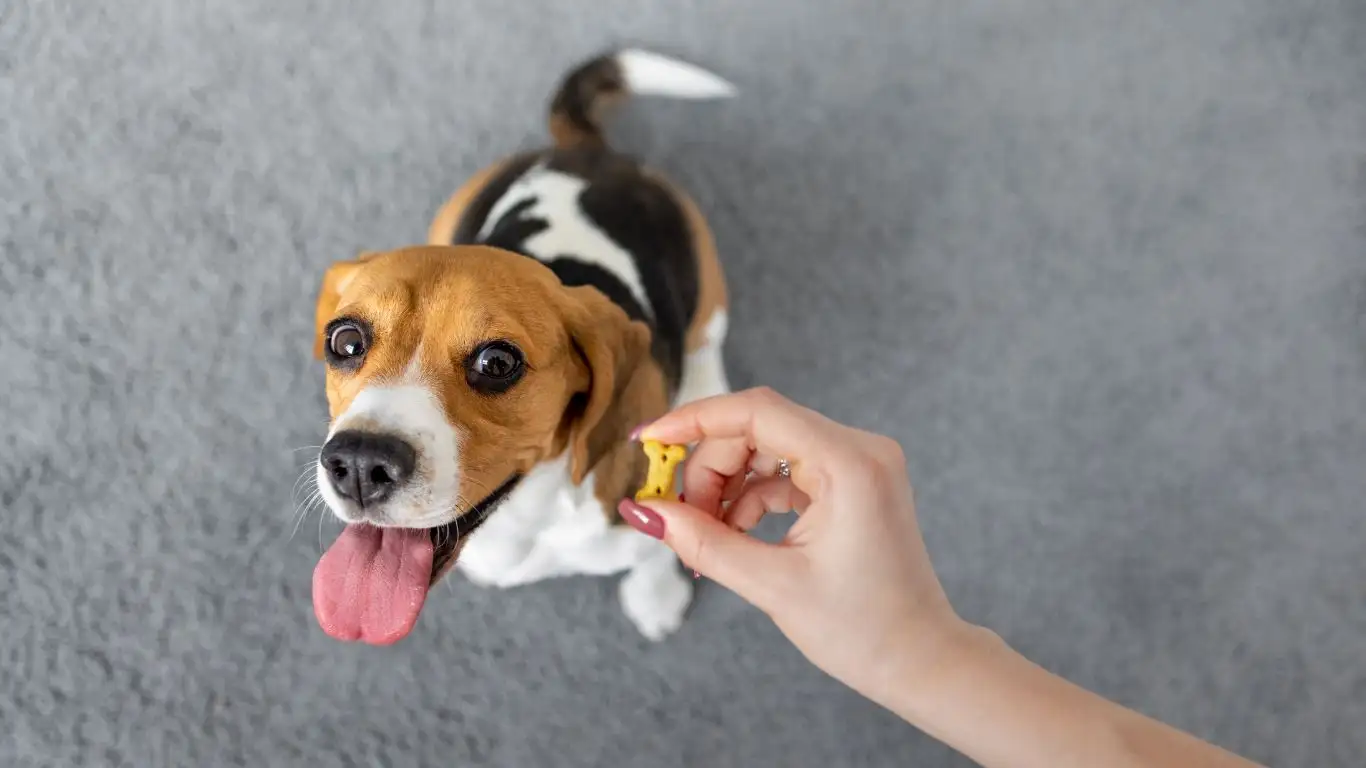
Just like humans, dogs benefit from a predictable bedtime routine. If your pup knows what to expect each night, they’ll settle in much more easily.
Pre-Bedtime Exercise
One of the biggest mistakes I see dog owners make? Not giving their pup enough exercise before bedtime! A tired dog is a happy, sleepy dog. Try these activities:
- Evening Walk: A 20-30 minute stroll helps burn off excess energy.
- Brain Games: Puzzle toys can mentally tire your pup out.
- Light Play: Tug-of-war or fetch before bedtime (but nothing too exciting).
Calming Pre-Sleep Activities
Dogs need to wind down just like we do. Try adding these calming activities into your nightly routine:
- Gentle Massages: A few minutes of soft petting or massage can relax your dog.
- Calming Music: Soft classical music or white noise can help reduce anxiety.
- A Comfort Item: Some dogs sleep better with a favorite blanket or toy.
Handling Nighttime Whining and Restlessness
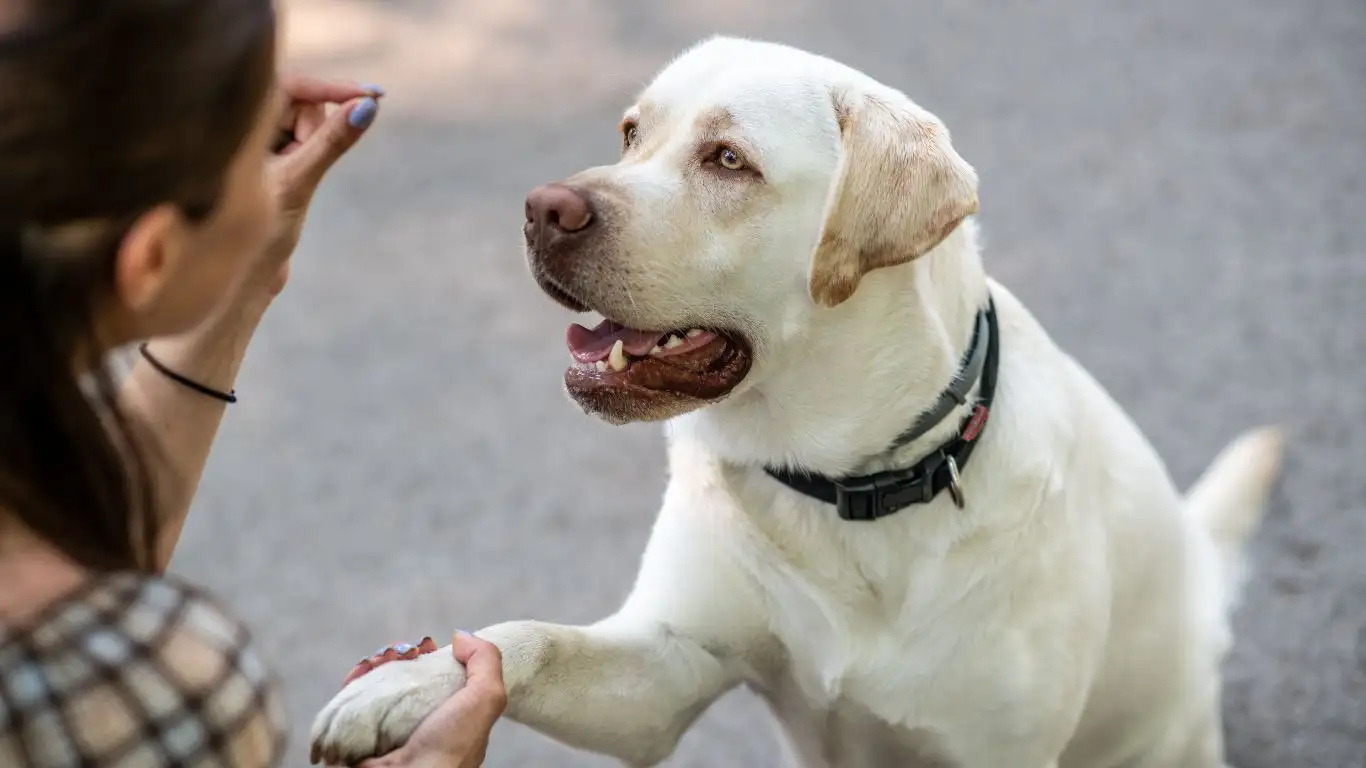
So, you’ve got the perfect bedtime routine and a cozy sleep setup, but your dog is still whining or pacing in the middle of the night? I’ve been there! Nothing is more frustrating than finally settling in, only to be woken up by a restless pup. Let’s break down why this happens and how to fix it.
Why Does My Dog Whine at Night?
Nighttime whining can mean a few different things. From my experience working with clients, it usually comes down to one of these:
- They Need a Potty Break: Puppies, seniors, or dogs new to your home may not be able to hold it all night.
- They’re Feeling Anxious: Separation anxiety or fear of the dark can lead to whining.
- They’re Bored: If your pup didn’t get enough mental or physical exercise, they might wake up wanting to play.
- They’ve Learned It Gets Your Attention: If you always respond, they’ll keep doing it.
How to Stop Nighttime Whining
First, make sure your dog’s needs are met before bedtime (exercise, bathroom break, comfy sleeping spot). If they still whine, here’s what to do:
- Ignore Attention-Seeking Whining: If you know they don’t need anything, avoid reinforcing the behavior.
- Provide a Comfort Item: A worn t-shirt with your scent can help anxious dogs settle.
- Use White Noise: A fan or white noise machine can block out nighttime sounds that might wake them.
- Try a Nightlight: Some dogs feel more secure with a dim light in the room.
How to Train a Dog to Sleep Through the Night

Now that we’ve covered the why, let’s talk about the how. Teaching your dog to sleep through the night takes consistency, but I promise—it’s worth it!
Step 1: Create a Consistent Bedtime Routine
Dogs thrive on routine. Set a specific time for “lights out” and stick to it. For my own dogs, I always follow the same steps:
- Potty break
- Final drink of water
- Gentle play or cuddle time
- Settle into bed with a calm cue like “time for bed!”
Within a few nights, they caught on—when I said “time for bed,” they automatically headed to their sleeping spots.
Step 2: Reinforce Positive Sleep Habits
Rewarding calm behavior is key! If your dog settles down quietly, offer praise or a small treat. On the flip side, avoid reacting to nighttime whining or restlessness—this can reinforce the behavior.
Step 3: Adjust Meal and Water Timing
Timing meals and water intake properly can prevent middle-of-the-night wake-ups.
- Last Meal: Feed dinner at least 2-3 hours before bedtime to allow for digestion.
- Water Cutoff: Offer water throughout the day but limit access 1-2 hours before bed (unless medically necessary).
Step 4: Make the Sleeping Area Safe and Comfortable
Dogs need to feel secure to sleep soundly. If your pup is new to your home or struggling to adjust, try:
- Crate Training: A properly introduced crate can be a safe, den-like space.
- A Cozy Bed: Make sure their bed is warm and cushioned.
- Soft Background Noise: This helps block out sounds that might wake them.
Training Puppies vs. Adult Dogs for Better Sleep
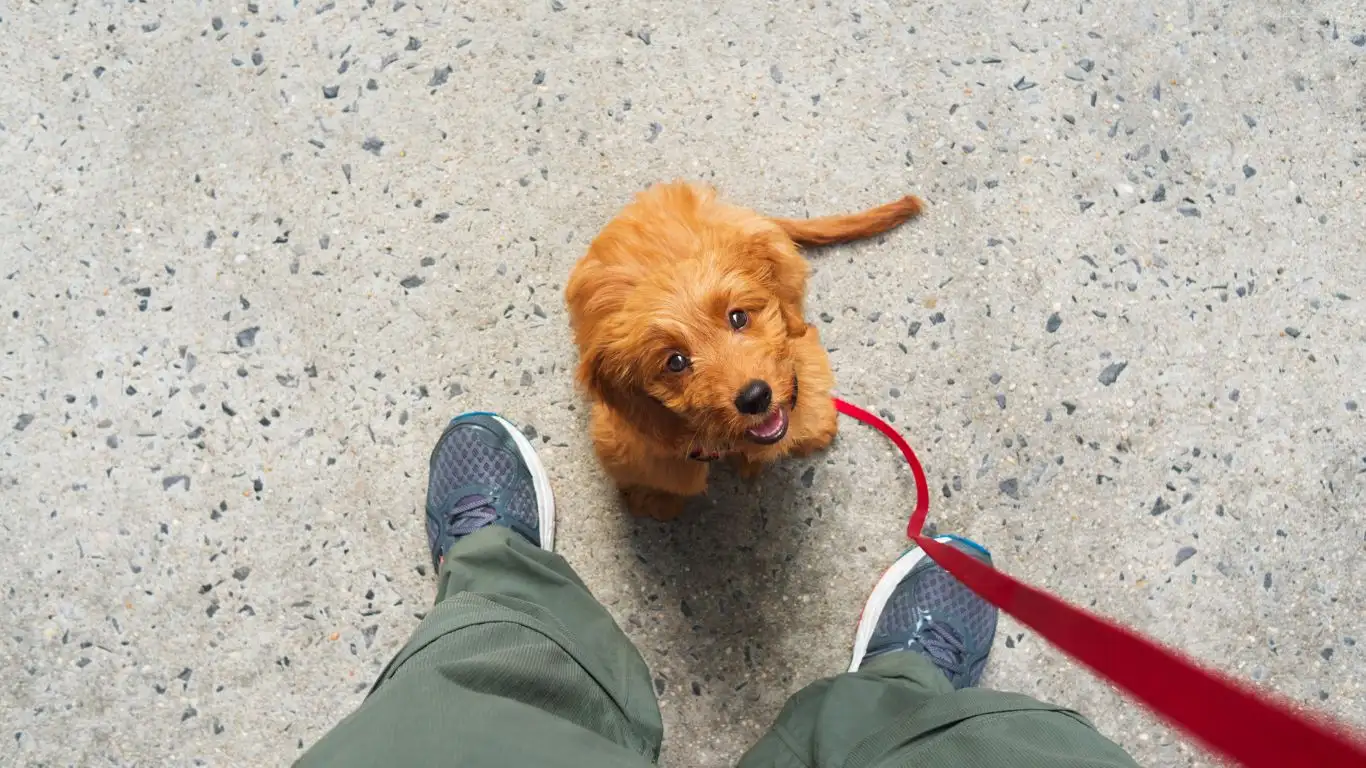
Puppies and adult dogs have different sleep needs, so your approach may vary.
Training Puppies
Puppies naturally wake up more often, but you can start building good sleep habits early:
- Set Realistic Expectations: Young pups may need a potty break every 3-4 hours.
- Crate Train Early: Teach them that their crate is a safe, cozy place.
- Use a Snuggle Toy: Some puppies sleep better with a warm stuffed animal.
Training Adult Dogs
For adult dogs, the challenge is often breaking old habits:
- Rule Out Health Issues: If a previously well-sleeping dog starts waking up, a vet check is a good idea.
- Reinforce Good Behavior: Ignore restlessness if it’s just attention-seeking.
- Adjust Exercise Levels: A tired dog is a sleepy dog!
Dealing with Nighttime Barking

One of the biggest challenges dog owners face is dealing with nighttime barking. It’s frustrating, disruptive, and can even cause tension with neighbors. I’ve worked with plenty of clients whose dogs suddenly start barking in the middle of the night, and the reasons can vary. Let’s break down why this happens and how to stop it.
Why Do Dogs Bark at Night?
Understanding the cause of barking is half the battle. Here are some common reasons your dog may be vocal at night:
- Alert Barking: If they hear a noise outside, they may be on high alert.
- Loneliness or Anxiety: Some dogs bark because they feel isolated.
- Lack of Exercise: A dog that hasn’t burned enough energy during the day may bark for attention.
- Medical Issues: Pain or discomfort can lead to restless barking.
How to Stop Nighttime Barking
Once you determine the cause, you can implement the right solution:
- Reduce External Triggers: Use blackout curtains, white noise, or move their bed away from windows.
- Ignore Attention-Seeking Barking: Reacting can reinforce the behavior.
- Provide a Calming Cue: A phrase like “quiet time” paired with a reward can help.
- Ensure Enough Daytime Stimulation: A well-exercised dog is less likely to bark out of boredom.
What to Do If Your Dog Wakes Up in the Middle of the Night

Even with proper training, there may be nights when your dog wakes up unexpectedly. Knowing how to handle these moments will prevent setbacks in their sleep training.
Step 1: Stay Calm and Assess the Situation
It’s tempting to immediately comfort or scold them, but first, figure out what’s causing the wake-up:
- Do they need to go outside? Puppies or senior dogs may have legitimate bathroom needs.
- Are they anxious? If they seem stressed, check for any unusual noises or changes in their environment.
- Could they be in pain? Sudden wake-ups accompanied by whining may signal discomfort.
Step 2: Keep Interactions Minimal
If you need to take your dog outside, keep things low-key:
- Use dim lighting instead of turning on bright lights.
- Avoid talking too much or giving extra attention.
- Lead them straight back to bed after their potty break.
Step 3: Reinforce Sleep Time
If your dog wakes up and wants to play, calmly return them to their sleeping spot and use a consistent sleep cue. I’ve found that using a phrase like “back to bed” in a soothing tone helps dogs understand that nighttime isn’t for play.
Final Tips for a Good Night’s Sleep
By now, you’ve got a solid understanding of how to train a dog to sleep through the night. But before we wrap up, here are some extra tips that have worked wonders for my clients (and my own dogs!).
Adjusting for Seasonal Changes
Believe it or not, the time of year can affect your dog’s sleep:
- Winter: Make sure their sleeping area is warm enough.
- Summer: Keep them cool with a fan or cooling mat.
- Daylight Savings: Gradually adjust their bedtime if needed.
Using Natural Sleep Aids
If your dog is particularly restless, consider natural remedies:
- Lavender essential oil: A light scent can promote relaxation.
- CBD treats: Some pet-safe CBD products can help with anxiety.
- Melatonin (Vet Approved): Some vets recommend melatonin for sleep issues.
When to See a Vet
If your dog has sudden sleep changes that don’t improve with training, it’s best to consult a vet. Medical issues like arthritis, digestive problems, or anxiety disorders could be the root cause.
References
- American Kennel Club (AKC) – Expert advice on dog sleep habits.
- ASPCA – Tips on managing separation anxiety.
- VCA Animal Hospitals – Information on health-related sleep disruptions.
Disclaimer
This article is for informational purposes only and should not replace professional veterinary advice. If your dog is experiencing ongoing sleep issues, consult a qualified veterinarian or certified dog trainer.
